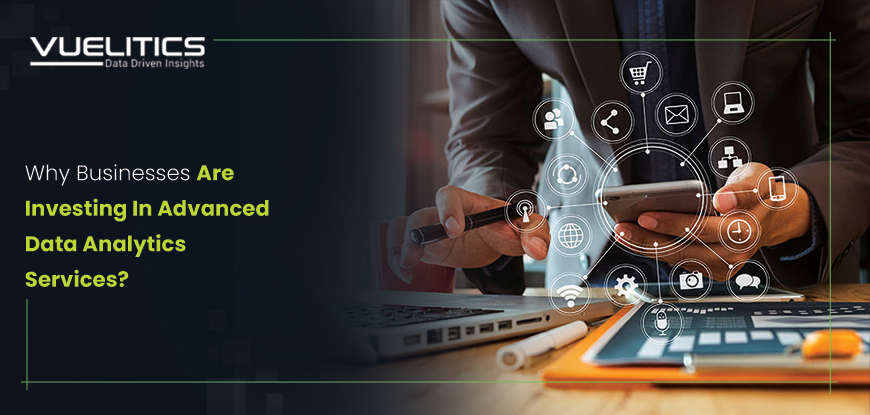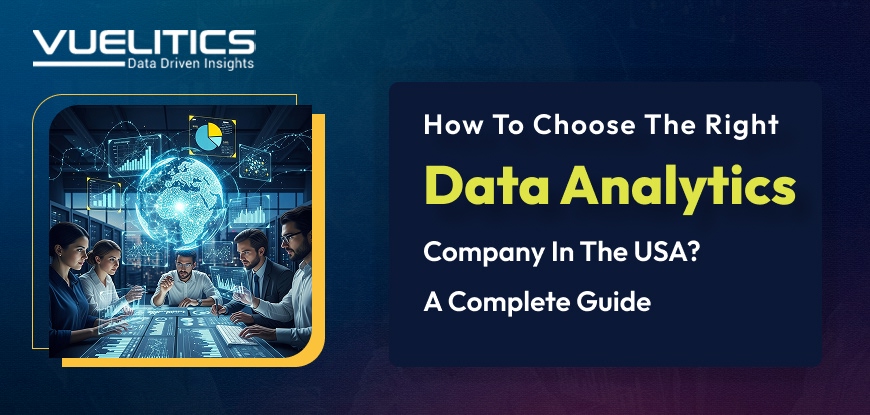- Home
- Blogs

Why Businesses Are Investing In Advanced Data Analytics Services?
In today’s turbo-charged, data-driven economy, companies are waking up to the fact that their fortunes of the future will be determined by how well they wield and leverage the truth hidden within their data. Traditional reporting and simple analytics can only take organizations so far in their efforts to remain competitive. Advanced data analytics is being demanded by organizations to gain a greater understanding, increase efficiency and become more intelligent in their decision-making.
From predictive modeling to instant dashboards, advanced analytics provide capabilities that are far-reaching and extend beyond mere numerical calculation. It enables businesses to predict future trends, customize customer experiences and optimize operations. In this article, we’ll look at why companies across sectors are relying on data and advanced analytics services. The roles these tools are playing in reshaping modern corporate functions.
What Is Advanced Data Analytics?
Advanced data analytics means that we are using more complex methods and technologies, like machine learning, AI, predictive modeling, and big data platforms, to help us analyze large amounts of complex data. Advanced analytics, unlike traditional prior schoolhouse report cards and other such regurgitations of facts and experience, all too frequently simply point out what was done and provide descriptive answers to “What happened?”
Why did it happen?
What actions should we take to get the best results?
This ability to combine foresight and strategy makes advanced data analytics a game-changer in industries ranging from finance and healthcare to marketing and retail.
Why Advanced Data Analytics Are the Top Focus for Businesses?
Data-Driven Decision-Making
It’s gone are the days when companies-based business decisions off intuition or guesswork. AI enables trust built using evidence-based analysis that executives will use to gauge uncertainty, anticipate opportunities and make informed decisions.
For instance, a retail business can leverage predictive analytics to predict demand for seasonal items and order the correct level of inventory while minimizing waste.
Competitive Advantage
Amid fierce competition in nearly every industry, companies using data and advanced analytics to their advantage are setting themselves apart. In recognizing hidden patterns, customer desires and market changes, the companies that do this can move quicker and smarter than their peers.
Enterprises that don’t use these tools risk lagging behind as others harness analytics to optimize businesses, reduce expenses, and enhance customer satisfaction.
Operational Efficiency
Efficiency is another reason organizations are beginning to focus on advanced data analytics. Advanced analytics can pinpoint supply chain bottlenecks, schedule your workforce more efficiently, and cut down on maintenance costs with predictive monitoring.
Manufacturers, for instance, tease insight from analytics to anticipate machine breakdowns in advance and reduce manufacturing downtime, thus staving off potential millions in repair and lost production value.
Customer-Centric Strategies
Modern customers expect personalized experiences. Companies can more effectively segment audiences, forecast customer behavior and personalize campaigns with advanced marketing analytics.
Online shopping platforms recommend their products based on browsing history through learned patterns in advanced analytics, and banks analyze transaction data to customize financial offers for clients.
Managing Big Data
The explosion of data with the proliferation of social media, IoT and digital transformation. Today’s analytics tools are not robust enough to handle this level of data scale and complexity. Real-time advanced analytics can crunch big data sets and extract insights that had been unwittingly lost to darkness.
Advanced Data Analytics in Healthcare
Health care is one of the most effective areas for advanced analytics to be used. Hospitals and medical facilities are employing healthcare analytics technology to enhance patient care and streamline operations.
Predictive analytics in healthcare enables physicians to forecast disease outbreaks and patient readmission.
The former is what we refer to as “driving prescriptions (of treatment),” where prescriptive analytics suggests personalized treatment plans that result in improved outcomes.
Operational analytics facilitates hospital asset management, such as staff planning and bed utilization.
For example, clinicians can use patient data to find at-risk individuals and act early on to minimize hospitalizations and enhance quality of care.
Marketing Advanced Analytics: Scale Personalization to New Heights
Another key domain is marketing advanced analytics, where enterprises leverage sophisticated tools to grasp their customer journeys and optimize their campaigns.
- Customer Segmentation: In the age of data, businesses can segment customers based simply on demographics and use psychographic information in behavior to hone their marketing.
- Optimization: Marketers can A/B test their different ad and content versions, then use analytics to determine which is best.
- Customer Lifetime Value (CLV): Looking at what a customer buys will allow a company to predict their long-term value and target resources to high-value customers.
For instance, video streaming services leverage intelligent analytics to suggest shows that match users’ watching behaviors and maintain high engagement and retention.
Benefits Associated with Advanced Data Analytics
Most companies that employ some form of advanced analytics while investing in their data will be able to reap several major benefits. The benefits include the following:
- Analytics assists in making the right decision.
- Predictive analytics enables efficient forecasting of market developments as well as the requirements of the customers.
- Helps save money.
- Diagnosing operational inefficiencies and waste.
- Real-time Business Intelligence—Reacting quickly to changes in consumer trends and markets.
- More Invention—Develop new products, services, or business models based on evidence.
How Companies Use Advanced Data Analytics?
Cloud solutions: Enterprises explore deploying cloud-based advanced analytics platforms for scalability and economic reasons.
AI and Machine Learning at Scale: Companies are integrating machine learning models within decision-making software to generate action when insights are met.
Cross-Department Collaboration: Advanced analytics do not only belong to IT anymore; marketing, finance operations, HR and other departments are embedding advanced analytics at a tactical level.
Alliance with Analytics SP (Service Provider): Organizations establish partnerships with outsourced data analytics experts they provide state-of-the-art data analytics services to speed up adoption and guarantee best practice.
Challenges in Adopting Advanced Analytics
The positives are evident, but bringing data and advanced analytics back into the business presents a number of challenges:
- Quality of Data: It is difficult to draw insights and make decisions based on bad data.
- Expensive Implementation Costs: The initial spending on tools, talent and infrastructure can be quite hefty.
- Gap in Skills: Throughout many organizations, there is a lack of qualified personnel with specialized skills in advanced analytics and AI.
- Redistribution of Power: There will be a resistance from staff against new processes driven through analytics.
In order to address these challenges, companies often begin on a small scale with pilot projects and increase scope as they start seeing results.
The Future of Advanced Analytics
- Fully automatic analytical systems with little human intervention.
- Enhanced personalization in customer engagement.
- Interface with Industrial IoT Devices to send in real-time Logistics/Healthcare/Manufacturing.
- Ethical and responsible AI; AI ethics in practice; data privacy and analytics transparency.
The companies purchasing these services today are future-proofing their businesses to ensure they are strong going forward.
Final Thoughts
Advanced data analytics is changing industries across the globe. From healthcare advanced analytics to marketing advanced analytics. Businesses are realizing swift and measurable value from these technologies to inform better decisions. Create more tailored experiences, and enforce operational efficiencies.
As more and more data is being produced, those organizations that invested in data and advanced analytics will not just survive but thrive in the future. Whether it’s delivering better patient care, predicting customer demand or optimizing supply chains, advanced analytics is no longer a “nice to have” but a fundamental imperative.
FAQ
What is advanced data analytics?
Advanced data analytics means using modern-day advanced analytics such as machine learning, AI, predictive modelling and big data tools to work on massive and complex raw datasets. It offers more than basic reporting giving you predictions, recommendations, and deeper insights.
What is advanced analytics vs. traditional analytics?
So classic analytics would describe what happened already, whereas a more advanced analytics product would try to predict what will happen and recommend actions to achieve better results.
What makes organizations invest in smart data analytics services?
Corporations are spending on the latest and greatest analytics tools in hopes of better decision-making, competitive advantage, cost control, business-process improvement and more effective management of their ever-growing mountain of data.
What is advanced analytics in healthcare example?
The healthcare sector applies advanced analytics for predicting patient readmission, personalizing treatment plans, optimizing resource allocation, and identifying high-risk patients in an early stage.



Post Comments